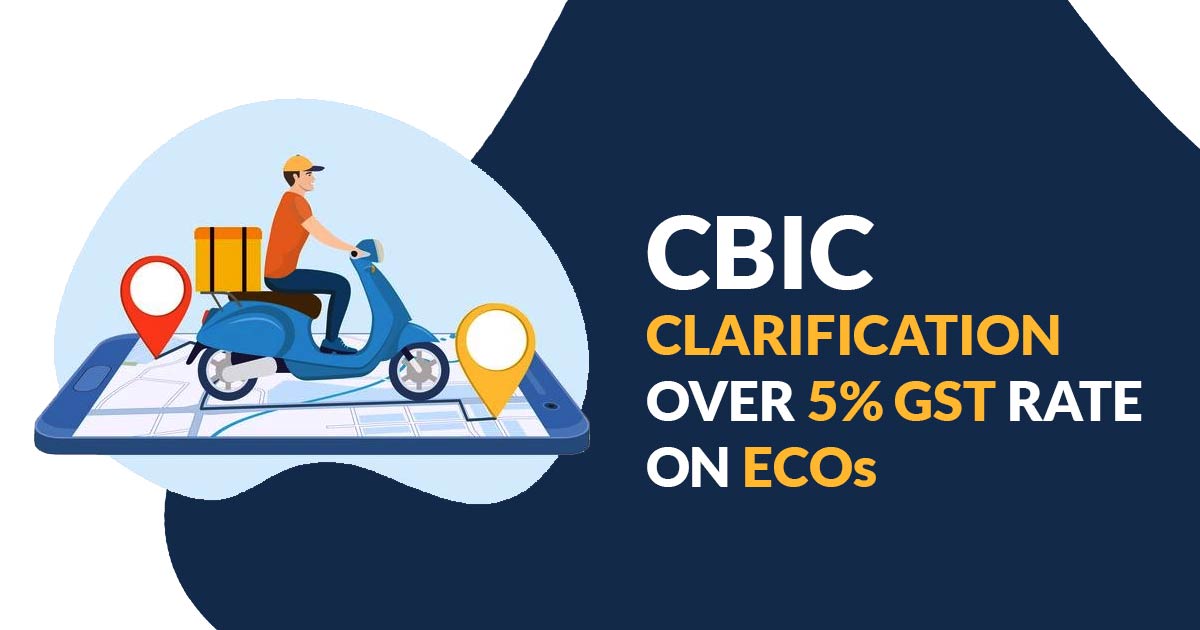
E-commerce operators (ECOs) such as Swiggy and Zomato shall be subjected to furnish 5% GST upon the restaurant services supplied from 1st January may be heckling with the generation of invoices on their own excluding the restaurants and third parties.
In September 2021 it was circulated that the tax liability shall be on ECOs for the restaurant services furnished through them. But the concern towards the procedure such as GST invoicing and the other compliances would be transparent through the notice furnished via revenue dept dated 17th Dec. As per the notification, the invoicing of the mentioned services would build the duty of ECOs.
Since the same provides ECOs only 2 weeks to execute, from 1st Jan 2022 an extension of time would be provided to them to execute the specific amendments in their GST invoicing software.
Various additional hardships in compliance and the restaurants via these apps would furnish the services of the restaurants along with the supply of the goods, for instance, people who purchase the Pizza and coke in their combo orders. Pizza is the restaurant service upon which the same apps shall need to file 5% GST and comply with the 1% Tax collected at source (TCS) norm upon coke. The coke draws 28% GST and is furnished through the restaurant. The same items in the same order shall need two invoices first through the app on Pizza and on Coke via restaurant, which would have prevented surging the TCS rate to 5%.
“Considering the above, if the government could clarify that ECO is only responsible for paying the tax and restaurants can continue to do the invoicing the way they are doing currently, it would make compliance of the above smoother. It would also fulfil the objective of the government which is that ECOs discharge the above tax liability, commented Rastogi.”
Drawing the food delivery apps under the compliance of restaurant services and make them enabled to file the tax rendered towards transferring the responsibility from the restaurants to apps to build the compliance at a brief and simpler despite the action shall seem to marginally raise the tax incidence upon small restaurants if not it gets exempt from GST whose yearly turnover is lower with respect to Rs 20 lakh.
As per the FAQs furnished through the Central Board of Indirect Taxes and Customs (CBIC), e-commerce operators shall file the GST liability towards the restaurant service in cash excluding any ITC. CBIC mentioned that the online food delivery apps shall carry on to avail the ITC prior to the taxes furnished on the expenses like advertisements and rents.
The new year shall start with a 5% GST imposed on the supplies furnished through the delivery apps like Zomato and Swiggy. FM Nirmala Sitharaman has circulated the decision. Food delivery apps shall be subjected to come under the same compliance as the restaurants come i.e a 5% GST would be imposed on the supplies they make from 1st Jan 2022.
The apps shall accumulate a 5% GST from the customers rather than from the restaurants as per the amended rule. The union govt has been engaged in making the rule to restrict the revenue leakage through the unregistered restaurants because of the lack of mandatory registration checks of restaurants through the apps.
The same is not effective news for the customers as the rule amended does not add the extra tax load on the customers in ordering the meals from the GST enrolled restaurants. The same decision shall draw the unenrolled restaurants under the GST slab. Hence the food delivery does not seem to get costlier. Though the customers might file more for food if these apps seem the way to pass the tax load on to the customers.
The customer is the only one who gets pointed out with respect to the amended rule commented by the Finance Ministry. Food apps were registered as Tax Collected at Source under GST records till now. GST was imposed on the restaurants that filed the same with the tax collector. But from the revised rule the tax shall be accumulated from the customers and furnished through the apps to the council. The tax was being furnished through the restaurant owners till now but the aggregator would indeed need to file that w.e.f. 2022.
During the announcement for the change in the rule in September month, the loss was made to the exchequer from the alleged under-reporting by food delivery aggregators of Rs 2,000 crores in the former 2 years.









